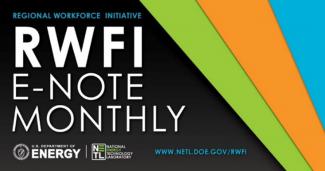The March 2022 edition of the RWFI E-Note Monthly, the newsletter of NETL’s Regional Workforce Initiative (RWFI), includes details on funding opportunities for advancing undergraduate STEM (science, technology, engineering and math) education from the National Science Foundation (NSF), which is vital for ensuring the growth of a future work force.
The U.S. Department of Labor has issued funding opportunity announcement (FOA) to solicit applications for the second round of Strengthening Community Colleges Training Grants. The purpose of this program is to address two inter-related needs: 1) to increase the capacity and responsiveness of community colleges to address identified equity gaps, and 2) to meet the skill development needs of employers in in-demand industries and career pathways, as well as the skill development needs of underserved and underrepresented workers.
The deadline for interested parties to submit proposals is June 2.
This month’s newsletter also details the U.S. Department of Energy’s (DOE) Minority Serving Institutions Partnership Program (MSIPP) and the MSIPP Tribal Education Partnership Program (TEPP). The programs support DOE and National Nuclear Security Administration (NNSA) grants for Minority Serving Institutions (MSI) and Tribal College and Universities (TCUs) to prepare the next-generation technical workforce. MSIPP aligns investments in university capacity and workforce development with DOE/NNSA mission areas to develop the needed skills and talent for DOE/NNSA’s enduring technical workforce and to enhance research and education at MSIs.
The program’s primary mission is to create and foster a sustainable STEM-pipeline that prepares a diverse workforce of world class talent through strategic partnerships between Minority Serving Institutions, TCUs and the DOE/NNSA Enterprise. To execute this mission, MSIPP builds a network of NSE ready students through enrichment activities from K-20 to post-doctoral level. Through university-lab consortia partnerships, students are exposed to cutting-edge research and activities in their relevant fields.
The deadline for interested parties to submit their project proposals is June 2.
The newsletter for March also presents project information on DOE’s Biological and Environmental Research’s (BER) Biosystems Design to Enable Safe Production of Next-Generation Biofuels, Bioproducts and Biomaterials. The overarching goal of the BER Program is to support transformative science to solve critical challenges in energy security and environmental stewardship. As part of its mission, BER invests in crosscutting technologies and programs to enable multiscale, systems-level research to achieve a predictive understanding of systems biology, biological community function, and environmental behavior. BER aims to provide the necessary fundamental science to understand, predict, manipulate, and design biological processes that underpin innovations for bioenergy and bioproduct research and to enhance our understanding of natural environmental processes relevant to DOE.
An objective is the development of the next generation of genome engineering technologies to unlock the potential of plants and microorganisms for the safe and efficient conversion of renewable biomass, captured carbon dioxide (CO2) from the atmosphere, and/or petroleum-derived polymers into fuels, valuable chemicals, and materials with novel properties, advancing towards a sustainable and secure bioeconomy.
April 6 marks the deadline for interested parties to submit their proposals.
Previous editions of RWFI E-Note Monthly can be found in the newsletter’s online archive. Click here for more information about the NETL Regional Workforce Initiative.
NETL is a U.S. Department of Energy national laboratory that drives innovation and delivers technological solutions for an environmentally sustainable and prosperous energy future. By leveraging its world-class talent and research facilities, NETL is ensuring affordable, abundant and reliable energy that drives a robust economy and national security, while developing technologies to manage carbon across the full life cycle, enabling environmental sustainability for all Americans.




